A Short Film that Stays Relevant for Long
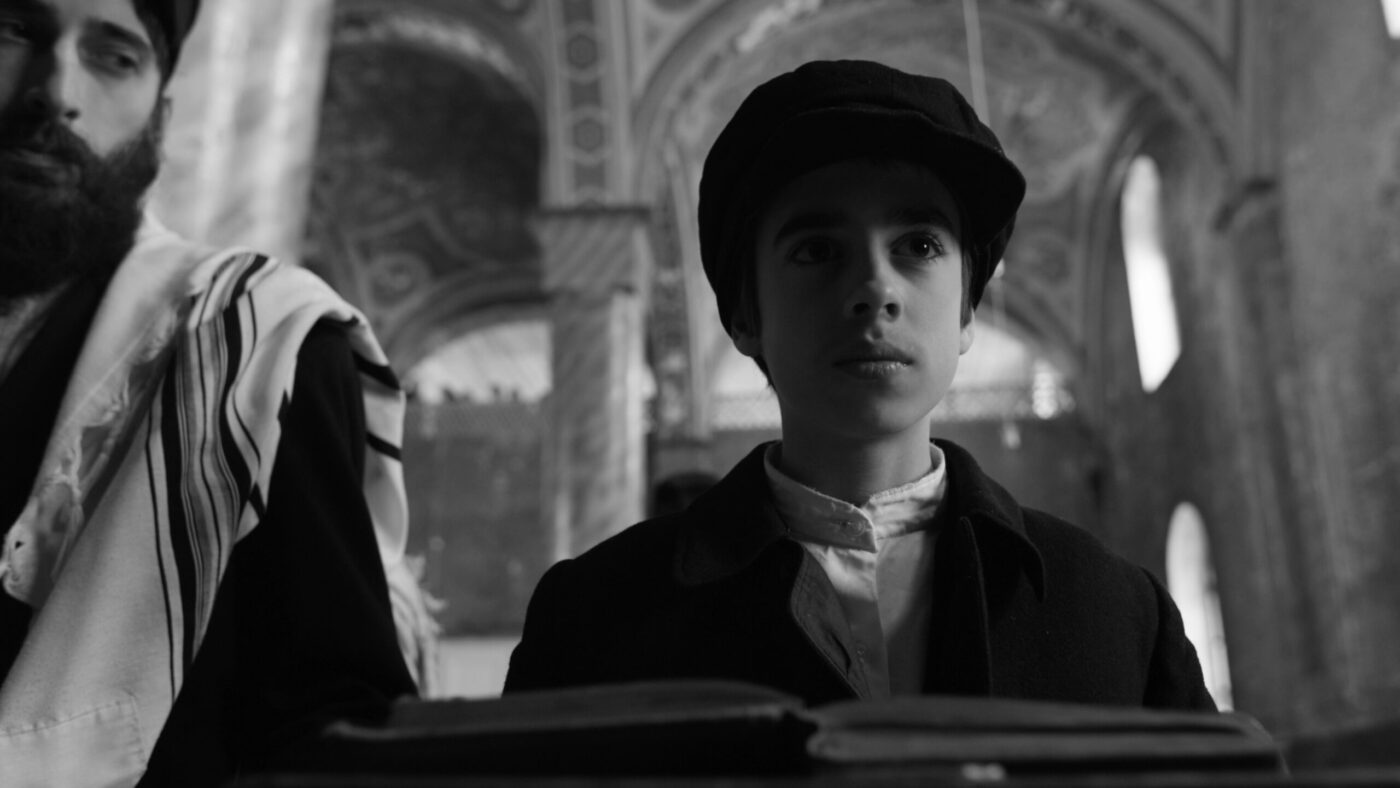
An important, but perhaps not widely appreciated part of the annual Ale Kino! Festival are the sets of short films, carefully selected and grouped into several age categories. For obvious reasons, I didn’t have a chance to see all of them – the great variety of the pieces forces to make some choices. Still, I want to write about at least a few that I did see and that I won’t forget because of both their message and form.
Strangely Unfinished Stories
‘In Our Synagogue’ (dir. Ivan Orlenko, Ukraine 2019) is one of the most poignant depictions of the Holocaust I’ve ever seen. Based on an unfinished novel by Franz Kafka (the writer left a lot of unfinished prose), it’s told from the point of view of a boy who’s fascinated by a strange animal that has lived in a synagogue for years. When the creature appears, women still scream terribly at its sight, but men have already got used to its presence. The Rabbi explains to the boy that the problem with the animal is difficult to solve: on the one hand, the Torah prohibits harming any living creatures, but on the other hand, according to the Talmud, the animal cannot live in the temple. Moreover, it cannot be caught because it’s clever and fast. Even the Rabbi’s grandfather claimed that it’s impossible to get rid of the beast.
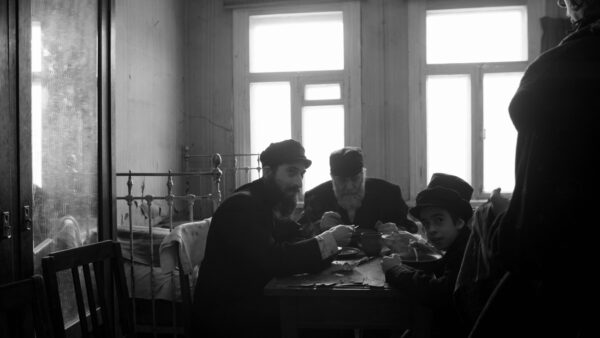
Events unravel in the background of their discussion, as if “avoided” by the camera: we only see the rabbi’s and the boy’s shoes, walking and immersed in the conversation until we hear someone yelling “Ausweis!” and the discussants are suddenly loaded on a truck and taken away from the town together with other Jews. At the execution site where they’ve been taken to, the camera again focuses almost exclusively on the boy and the rabbi. When the boy asks another question, they’re already standing with their backs turned to the firing squad, and the rabbi answers: “I don’t have time to tell you anything more, and you don’t have time to listen.”
What kind of animal they’d been talking about is open to interpretation, but we know that Kafka’s prose is full of universal metaphors. This is why, even though Kafka died in 1924, the filmmaker decided to move the plot to the period of World War II. The fact that the novel wasn’t finished corresponds with the character’s unresolved conversation, and the camera's “negligence” poses a question if, when deep in discussion, we tend to overlook the attack of an animal, or if we turn a blind eye to something that’s already there, but terrifies us?
We Are Innocent
‘The Flies’ (Italy 2020) is a moving picture by Edgardo Pistone that shows the life of young people growing up in Naples. The director grew up and studied in this city, and his university thesis had a significant title: La tragedia che fa ridere, la farsa che fa piangere (A Tragedy That Makes You Laugh, a Farce That Makes You Cry). His personal background is reflected in the exceptional credibility the film’s been made with.
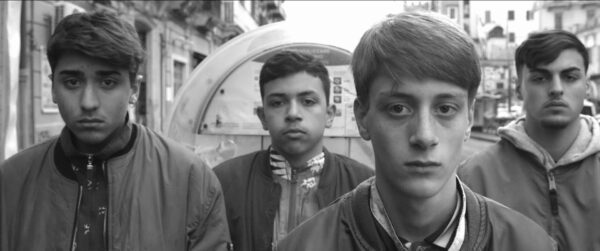
The tragedy of young, lost people who don’t know what to do with their lives and spend most of their time on the streets was shot in black and white. Because of that, the bleakness of everyday life, in which they seek excitement by coming up with stupid ideas, mocking the street madman Cirobello, smoking, drinking and wandering aimlessly (just like the titular flies, walking on the rotten tissue), is even more poignant. One of their stupid ideas leads to a car accident in which Cirobello dies and which becomes the unfortunate moment when the kids move from their adolescent innocence to a stigmatized adulthood.
Their story was shown in simple, ascetic frames, organized into four quarters (four boys, four girls), in which the protagonists are always shown in a group. It’s only at the end of the film, after the accident, that the faces of individual boys appear separately – frontally, as in police mug shots – and we hear a short explanation from each of them, as if taken from an interrogation, claiming they’re innocent. The author of the film doesn’t judge the boys – rather than that, his film accuses the hopeless situation in which they live: their lack of perspectives, boredom, being left to their own devices. It seems like Edgardo Pistone knows very well what it is like to be young in Naples, a city of poverty. Additionally to making films, he works for various associations, teaching the art of film to young people in the suburbs.
Just Like in a Game
Iranian short film ‘Raya’ (dir. Sepideh Berenji, 2019) depicts a story of a girl who thinks she can control everything around her and treats life like a game. In that sense, you can, for example, push a pot from a window so that it hits a landlady trying to evict her family on the head. The father doesn’t want to move out and threatens the landlord. “I’m just like him” – claims the girl, and criticizes her mother who intends to give up: “Do you always do what you’re told?.” She once throws eggs at the teacher who she keeps fighting with, repeating over and over again: “I control everything”. This illusory sense of control is perfectly shown with animated means (even though it’s a live action movie): the girl “swipes” a street cat she sees through the window with her finger, as if she was using a mouse cursor to move forward in a film on her computer screen. This is one of the most interesting scenes, which, although short, says a lot about the way teenagers think about the world.
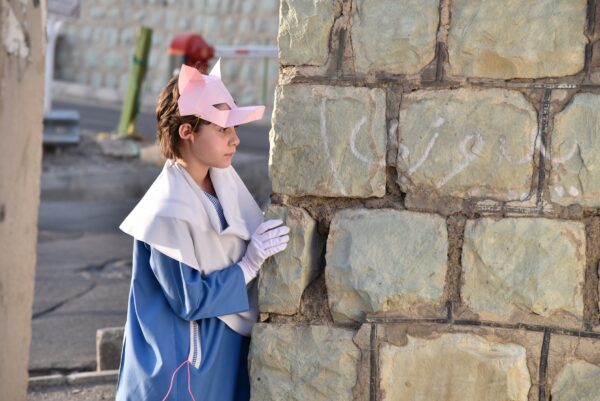
The protagonist changes her way of thinking when her stubborn and aggressive father is confronted by the police (topped with a humorous comment that “the dinosaurs, despite their size, have gone extinct”), while, at the same time, she hears from her teacher (who doesn’t punish her for the egg episode) that she can come and talk to her. The girl makes a choice: instead of dropping a pot on the landlady’s head, she goes downstairs and starts talking to her. We don’t know if this conversation will change anything, but we do know that there was someone who showed the teenager that between complete passiveness and aggressive attempts to control everything, there is a third option – we can’t control the results of every our choice, but we can always choose a more mature one.
It’s a unique piece – not only because of its ethical message, but also because of its humorous overtones in which the protagonist’s inner dialogue and priorities were shown. Thanks to them, the filmmakers avoided being too moralizing.
My Dad Doesn’t Like Refugees
A Norwegian short film “The Kicksled Choir” (dir. Torfinn Iversen, 2020) captivated me with its simple storytelling and an excellent acting performance of a young boy playing the leading role. The story takes place in a small Norwegian town, where the local community formed a choir riding a sleigh from one house to another to collect donations and clothes for immigrants before Christmas. The little protagonist sings beautifully and would also like to join the choir. His father, however, is rather hostile towards foreigners, even getting into a fight with one of them and chasing the charity choir away when they visit his house. The boy faces a dilemma of being loyal to his father (who has recently become a widower) or choosing singing and joining the community in helping immigrants.
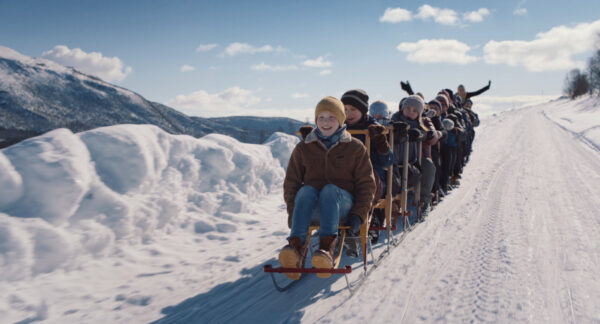
The film was made with a great focus on a credible representation of the boy’s feelings. Since there isn’t too much talking in it, a lot is implied and has to be read between the lines of when people involved in the conflict confront each other. A whole range of feelings can be seen on the little boy’s face (he’s got a great career ahead of him if he continues acting) – from fear of his father and rejection, to doubt and occasional courage.
These moments of courage – when he engages in a conversation with a foreigner beaten up by his father, and when he tells his father that Mr. X is sorry for what happened by the river – are the victory of the boy’s sensitivity and compassion over fear and obedience. However, what is most interesting, this victory isn’t achieved by a fight or acts of rebellion, but by cunning children often use when they have to deal with adults. We don’t really know what was said in the exchange with the immigrant. It’s doubtful that he would apologize to his attacker. Still, both conversations were so effective that the father ends up taking a box of clothes to the refugee centre and his son joins the choir. It’s one of those films in which children have great power – not because of magic, but their emotional intelligence and determination in pursuit of their dreams.
Barbara Kowalewska


